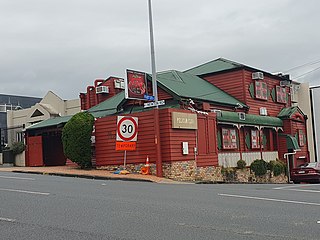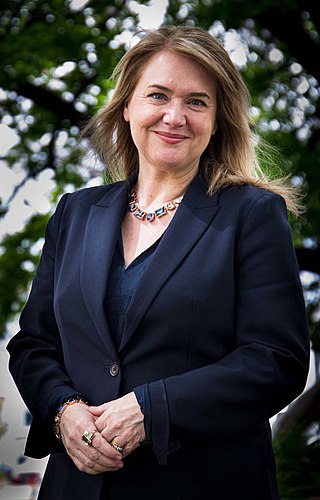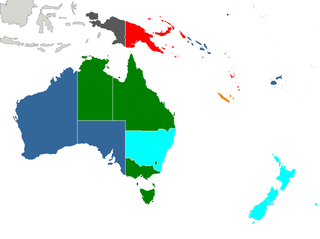
Andrew Inglis Clark was an Australian founding father and co-author of the Australian Constitution; he was also an engineer, barrister, politician, electoral reformer and jurist. He initially qualified as an engineer, but he re-trained as a barrister to effectively fight for social causes which deeply concerned him. After a long political career, mostly spent as Attorney-General and briefly as Opposition Leader, he was appointed a Senior Justice of the Supreme Court of Tasmania. Despite being acknowledged as the leading expert on the Australian Constitution, he was never appointed to the High Court of Australia.

Prostitution in New Zealand, brothel-keeping, living off the proceeds of someone else's prostitution, and street solicitation are legal in New Zealand and have been since the Prostitution Reform Act 2003 came into effect. Coercion of sex workers is illegal. The 2003 decriminalisation of brothels, escort agencies and soliciting, and the substitution of a minimal regulatory model, created worldwide interest; New Zealand prostitution laws are now some of the most liberal in the world.
The history of Tasmania begins at the end of the Last Glacial Period when it is believed that the island was joined to the Australian mainland. Little is known of the human history of the island until the British colonisation of Tasmania in the 19th century.

Carol Louise Brown, an Australian politician, has been an Australian Labor Party member of the Australian Senate representing the state of Tasmania since 25 August 2005.
Lin Estelle Thorp is a former Australian politician. She was a Labor Party member of the Tasmanian Legislative Council from 1999 until 2011, representing the electorate of Rumney, and serving as Minister for Human Services (2008–2010) and Minister for Education and Skills, Minister for Children, and Minister for Police and Emergency Management (2010–2011) in the Bartlett and Giddings governments. She was defeated for re-election to her state seat by independent Tony Mulder at the 2011 periodic elections, but was subsequently nominated to a casual vacancy for the Australian Senate in June 2012 caused by the resignation of Nick Sherry. She was defeated from the third position on the Tasmanian Labor Senate ticket at the 2013 federal election, and her term ended on 30 June 2014.

In Great Britain, the act of engaging in sex as part of an exchange of various sexual services for money is legal, but a number of related activities, including soliciting in a public place, kerb crawling, owning or managing a brothel, pimping and pandering, are illegal. In Northern Ireland, which previously had similar laws, paying for sex became illegal from 1 June 2015.
Tasmania's Relationships Act 2003 provided for registration and recognition of a type of registered partnership in two distinct categories: Significant Relationships and Caring Relationships. The same Act also amended 73 pieces of legislation to provide registered partners with nearly all of the rights offered to married couples within the state. Furthermore, since July 2009, these relationships are recognised at federal level, providing couples with almost all of the federal rights and benefits of marriage. The legislation came into effect on 1 January 2004. In September 2010, the Parliament of Tasmania approved legislation to recognize same-sex unions performed outside Tasmania as significant relationships.

Prostitution or sex work in Australia is governed by state and territory laws, which vary considerably. Federal legislation also affects some aspects of sex work throughout Australia, and of Australian citizens abroad.
Current laws passed by the Parliament of Canada in 2014 make it illegal to purchase or advertise sexual services and illegal to live on the material benefits from sex work. The law officially enacted criminal penalties for "Purchasing sexual services and communicating in any place for that purpose."

Toonen v. Australia was a landmark human rights complaint brought before the United Nations Human Rights Committee (UNHRC) by Tasmanian resident Nicholas Toonen in 1994. The case resulted in the repeal of Australia's last sodomy laws when the Committee held that sexual orientation was included in the antidiscrimination provisions as a protected status under the International Covenant on Civil and Political Rights (ICCPR).
In Australia, domestic violence (DV) is defined by the Family Law Act 1975. Each state and territory also has its own legislation, some of which broadens the scope of that definition, and terminology varies. It has been identified as a major health and welfare issue. Family violence occurs across all ages and demographic groups, but mostly affects women and children, and at particular risk are three groups: Indigenous, young and pregnant women.
The passage of the Canadian Charter of Rights and Freedoms in 1982 allowed for the provision of challenging the constitutionality of laws governing prostitution law in Canada in addition to interpretative case law. Other legal proceedings have dealt with ultra vires issues. In 2013, three provisions of the current law were overturned by the Supreme Court of Canada, with a twelve-month stay of effect. In June 2014, the Government introduced amending legislation in response.
Sir Eardley Max Bingham, was an Australian politician. He was Deputy Premier and Opposition Leader of Tasmania, who represented the electorate of Denison for the Liberal Party in the Tasmanian House of Assembly from 1969 to 1984.

Lesbian, gay, bisexual, and transgender (LGBT) people in the Australian state of Tasmania have the same legal rights as non-LGBT people. Tasmania has a transformative history with respect to the rights of LGBT people. Initially dubbed "Bigots Island" by international media due to intense social and political hostility to LGBT rights up until the late 1990s, the state has subsequently been recognised for LGBT law reforms that have been described by activists such as Rodney Croome as among the most extensive and noteworthy in the world. Tasmania imposed the harshest penalties in the Western world for homosexual activity until 1997, when it was the last Australian jurisdiction to decriminalise homosexuality after a United Nations Human Rights Committee ruling, the passage of federal sexual privacy legislation and a High Court challenge to the state's anti-homosexuality laws. Following decriminalisation, social and political attitudes in the state rapidly shifted in favour of LGBT rights ahead of national trends with strong anti-LGBT discrimination laws passed in 1999, and the first state relationship registration scheme to include same-sex couples introduced in 2003. In 2019, Tasmania passed and implemented the world's most progressive gender-optional birth certificate laws. In July 2023, the Tasmanian government officially included and also added "asexual or asexuality".

Madeleine Ruth Ogilvie is an Australian lawyer and politician. She is a Liberal Party member of the Tasmanian House of Assembly representing the Division of Clark and is the Minister for Small Business, Advanced Manufacturing and Defence Industries, Science and Technology, Racing and Heritage in the Rockliff ministry. She was previously the Minister for Hospitality, Racing, Small Business, Women and Disability Services in the Second Gutwein Ministry for six weeks.
Susanne Lynnette Hickey is an Australian politician. She represented the electorate of Denison from the 2018 state election until her defeat at the 2021 election, sitting with the Liberal Party until March 2021, when she quit the party and became an independent.

Prostitution in Oceania varies greatly across the region. In American Samoa, for instance, prostitution is illegal, whereas in New Zealand most aspects of the trade are decriminalised.
Eloise Rafia "Ella" Haddad is an Australian politician. She was elected to the Tasmanian House of Assembly for the Labor Party in the Division of Denison at the 2018 state election, reelected at the 2021 Tasmanian state election and is currently the member for Clark after Denison was renamed.

Claire Chandler is an Australian politician who was elected as a Senator for Tasmania at the 2019 Australian federal election. She is a member of the Liberal Party.
Grace Tame is an Australian activist and advocate for survivors of sexual assault. Tame was named 2021 Australian of the Year on 25 January 2021.








